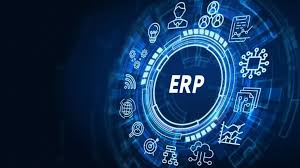Efficiency and data integration have been the backbone of today’s business. In this context, the need for ERP Software in companies which are indeed scalable is a requirement at their core. Enterprise resource planning is nothing but bringing all multiple business processes of a company under one roof so that every part functions well in its capacity to deliver one cohesive goal. The blog provides the core benefits of ERP software, with the features that make it a must-have for any business and can be transformational.
What is ERP Software?
“ERP software” refers to the system that coordinates all the primary business functions like finance, human resources, supply chain, inventory management, and customer relationship management or CRM. It is similar to one database wherein every department will have this type of information in real time.
Why Do Businesses Need ERP Programs?
1. Improved Efficiency
An ERP system automatically deals with mundane work, such as repetitive tasks, avoiding the tedious process of doing it manually. The chances of errors are also reduced in this process. ERP system will save the employee time from too much waste in repetitive tasks so that it will be more about strategy rather than routine.
Example: An ERP System automatically processes invoice generation, payroll processing, and order processing.
2. Enhanced Data Accuracy and Consistency
A centralised database accessible by all departments allows constant improvement in collaboration with decisions resulting from an informed decision. For instance, the sales team may view current inventory levels in real-time, thus avoiding over-promises with customers.
3. Better Reporting and Analytics
Most ERP software contains an analytics tool. Depending on the software, one can generate customised reports to analyse where the firm has strengths and weaknesses. This could be sales growth, customer buying behaviour, and organisational bottlenecks. The data can be used as a guide in making the right management decisions and formulating correct strategies.
Key Features to Look for in an ERP Program
While choosing the right ERP program is necessary, features should align with your business needs. Here are some must-haves:
- Customizable Dashboards: This is how to show data in a presentation form acceptable to the structure of your business and departmental workflows.
- Scalability: The ERP software should be able to scale up with your business as you scale up your operations.
- Mobile Access: It is imperative to opt for an ERP system that is accessible on mobile devices primarily because most people work from home.
- Integration Capabilities: Choose to implement an ERP application that integrates seamlessly with other software programs already being used. This would include integration with CRM applications and even inventory management applications.
How ERP Software Transforms Business Operations
1. Optimizes Financial Management
ERP software makes the financial management simple through integrating different data sources, accuracy in accountancy, and improvement in budget management. Financial reports are automatically generated to allow business leaders to trace expenses and revenue, therefore making financial planning easier.
2. Streamlines Supply Chain Operations
An ERP program offers end-to-end supply chain visibility. Because an ERP program provides better visibility, businesses can thus predict demand much better, manage suppliers more efficiently, and optimize the inventories they hold. Consequentially, these shall contribute toward cost savings and higher customer satisfaction through timely deliveries.
3. Boosts Customer Service
Several ERP systems contain a CRM module or can be integrated with independent CRM software packages. This allows teams to keep track of customer interactions and can entail tracking leads as an avenue toward more personalised service. The availability of more information also allows customer-confronted teams to respond quicker to issues from clients.
Benefits of Implementing ERP Software
Reduced Operational Costs: ERP systems also enable the reduction of operational costs by automating and optimising processes, freeing resources to be utilised for more strategic initiatives.
Improved Compliance and Risk Management: Most ERP programs are equipped with tools that enable compliance management. A business can adhere to standardised regulatory requirements. The tools further offer the feature of risk management, mitigating possible threats.
Better Scalability: Whether you have a newly started business or an established company, a good ERP software solution develops with the company and is, hence, an investment in the long term.
Challenges and Solutions
ERP software also has many downsides. First of all, they are too costlier in the implementation phase. Moreover, they are complicated to implement. How do we solve these problems?
- Opt for Cloud-Based ERP Programs: These have lesser setting up costs, are scalable, and are even less complicated to maintain.
- Invest in Training: It would take much time and effort to ensure that your employees are adequately trained to make the most use of the functionality of the ERP software.
- Choose the Right Vendor: This makes it imperative that you select the right vendors with a sound customer service support system and that you can regularly update the software, too.
Conclusion
Adopting ERP software is a practical business transformation that enables optimum operations efficiency, data accuracy, and decision-making quality. Whether you are a small or a large enterprise, an ERP program will equip you with the flexibility and tools to face today’s market scenario. An ERP system lets your business run perfectly cohesively to create growth and profitability simultaneously as it integrates various business functions.
Any dynamic business landscape would make an all-encompassing ERP program inevitable. Not only does it meet your requirements of having all operations solutions in one basket, but it also propels you into more long-term growth and scalability.

